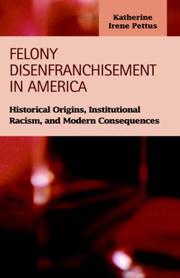| Listing 1 - 4 of 4 |
Sort by
|
Book
ISBN: 1805391127 1800739591 1800739583 9781805391128 Year: 2023 Publisher: New York, New York : Berghahn Books,
Abstract | Keywords | Export | Availability | Bookmark
 Loading...
Loading...Choose an application
- Reference Manager
- EndNote
- RefWorks (Direct export to RefWorks)
Over the course of its history, the German Empire increasingly withheld basic rights-such as joining the army, holding public office, and even voting-as a form of legal punishment. Dishonored offenders were often stigmatized in both formal and informal ways, as their convictions shaped how they were treated in prisons, their position in the labour market, and their access to rehabilitative resources. With a focus on Imperial Germany's criminal policies and their afterlives in the Weimar era, Citizens into Dishonored Felons demonstrates how criminal punishment was never solely a disciplinary measure, but that it reflected a national moral compass that authorities used to dictate the rights to citizenship, honour and trust.
Ex-convicts --- Felon disenfranchisement --- Disenfranchisement, Felon --- Felony disenfranchisement --- Prisoners --- Political rights, Loss of --- Ex-cons --- Ex-offenders --- Ex-prisoners --- Formerly incarcerated persons --- Recidivists --- Suffrage --- Germany --- Politics and government

ISBN: 1280361441 9786610361441 1593321635 9781593321635 9781593320614 1593320612 9781280361449 6610361444 Year: 2005 Publisher: New York : LFB Scholarly Publishing LLC,
Abstract | Keywords | Export | Availability | Bookmark
 Loading...
Loading...Choose an application
- Reference Manager
- EndNote
- RefWorks (Direct export to RefWorks)
Felon disenfranchisement --- Criminal justice, Administration of --- Disenfranchisement, Felon --- Felony disenfranchisement --- Prisoners --- Political rights, Loss of --- Suffrage --- Convicts --- Correctional institutions --- Imprisoned persons --- Incarcerated persons --- Prison inmates --- Inmates of institutions --- Persons --- Inmates
Book
ISBN: 1593327161 9781593327163 1593326017 9781593326012 9781593326012 Year: 2013 Publisher: El Paso [TX]
Abstract | Keywords | Export | Availability | Bookmark
 Loading...
Loading...Choose an application
- Reference Manager
- EndNote
- RefWorks (Direct export to RefWorks)
Utilizing a field study on felons that were within one year of completing incarceration, Pinkard analyzes the legal history, constitutionality, conflicting laws, political, and life chance consequences of felon disenfranchisement laws on African American felons and the African American community. Research and data presented in this book indicate that: felon disenfranchisement is based on moralistic beliefs, modern racism, and stereotypes about human differences and that permanent political marginalization of a particular segment of American society not only negates democracy in principle by di
Felon disenfranchisement --- African American criminals. --- Political rights, Loss of --- Racism --- Election law --- Loss of political rights --- Punishment --- Suffrage --- Citizenship, Loss of --- Infamy (Law) --- Afro-American criminals --- Criminals, African American --- Negro criminals --- Criminals --- Disenfranchisement, Felon --- Felony disenfranchisement --- Prisoners --- States. --- Law and legislation --- Ex-convicts --- Ex-cons --- Ex-offenders --- Ex-prisoners --- Formerly incarcerated persons --- Recidivists
Book
ISBN: 0823262421 0823268985 0823262448 0823262456 9780823262427 Year: 2014 Publisher: New York : Fordham University Press,
Abstract | Keywords | Export | Availability | Bookmark
 Loading...
Loading...Choose an application
- Reference Manager
- EndNote
- RefWorks (Direct export to RefWorks)
At the start of the twenty-first century, 1 percent of the U.S. population is behind bars. An additional 3 percent is on parole or probation. In all but two states, incarcerated felons cannot vote, and in three states felon disenfranchisement is for life. More than 5 million adult Americans cannot vote because of a felony-class criminal conviction, meaning that more than 2 percent of otherwise eligible voters are stripped of their political rights. Nationally, fully a third of the disenfranchised are African American, effectively disenfranchising 8 percent of all African Americans in the United States. In Alabama, Kentucky, and Florida, one in every five adult African Americans cannot vote. Punishment and Inclusion gives a theoretical and historical account of this pernicious practice of felon disenfranchisement, drawing widely on early modern political philosophy, continental and postcolonial political thought, critical race theory, feminist philosophy, disability theory, critical legal studies, and archival research into state constitutional conventions. It demonstrates that the history of felon disenfranchisement, rooted in post slavery restrictions on suffrage and the contemporaneous emergence of the modern “American” penal system, reveals the deep connections between two political institutions often thought to be separate, showing the work of membership done by the criminal punishment system and the work of punishment done by the electoral franchise. Felon disenfranchisement is a symptom of the tension that persists in democratic politics between membership and punishment. This book shows how this tension is managed via the persistence of white supremacy in contemporary regimes of punishment and governance.
Suffrage --- Prisoners --- Political rights, Loss of --- Discrimination in criminal justice administration --- Punishment --- Convicts --- Correctional institutions --- Imprisoned persons --- Incarcerated persons --- Prison inmates --- Inmates of institutions --- Persons --- Loss of political rights --- Citizenship, Loss of --- Infamy (Law) --- Inmates --- Law and legislation --- Civil Death. --- Felon Disenfranchisement. --- John Locke. --- Liberalism. --- Maryland. --- Michel Foucault. --- Punishment. --- Voting Rights. --- inclusion. --- political membership. --- race. --- United States --- Politics and government. --- Suffrage - United States --- Prisoners - Suffrage - United States --- Political rights, Loss of - United States --- Discrimination in criminal justice administration - United States --- Punishment - United States --- Citizenship - United States --- Race - Political aspects - United States --- Liberalism - United States --- Citizenship --- Race --- Liberalism
| Listing 1 - 4 of 4 |
Sort by
|

 Search
Search Feedback
Feedback About UniCat
About UniCat  Help
Help News
News